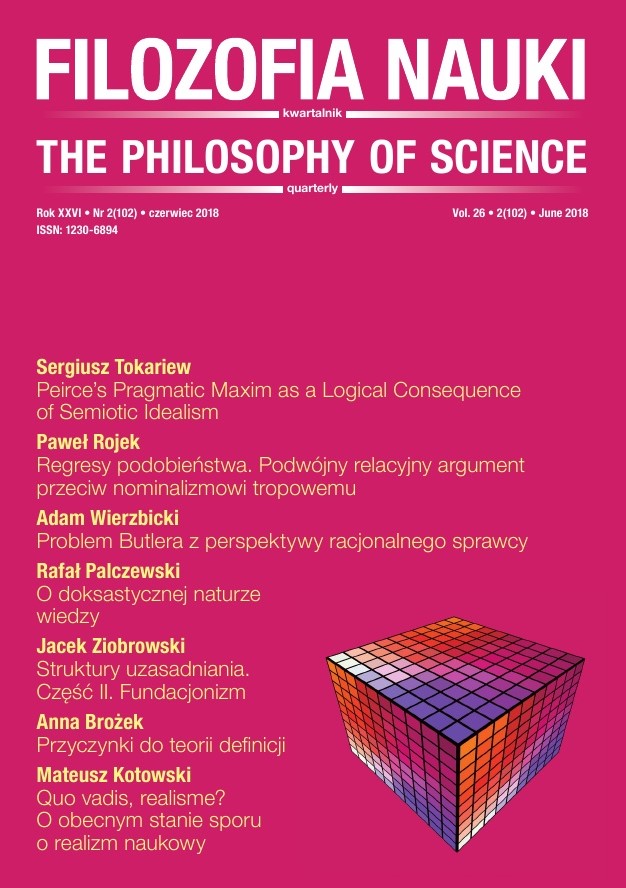Butler’s Problem from a Rational Agent’s Perspective
DOI:
https://doi.org/10.14394/filnau.2018.0010Keywords:
Butler's problem, rational agent, intentional action, motivation, moral judgmentAbstract
Butler’s problem poses a challenge to philosophical theories of intentional action because it suggests that intentionality attribution is dependent on moral judgement. Experimental results reached so far seem to confirm this thesis. However, the agent described in Butler scenarios seems to lack fundamental rationality, which may distort intuitions about the intentionality of his/her actions. An experimental study described in this work aims to overcome this problem by providing explicit reasons for action. Strength of motivation is also compared with moral judgement as a factor in intentionality attribution. The results of the study suggest that neither explicitly described reasons nor strength of motivation have a significant influence on intentionality attribution in Butler scenarios.
References
Bernoulli D. (1738/1954), Exposition of a New Theory on the Measurement of Risk, tłum. L. Sommer, "Econometrica" 22(1), 23-36. https://doi.org/10.2307/1909829
Briggs R. (2017), Normative Theories of Rational Choice. Expected Utility [w:] The Stanford Encyclopedia of Philosophy (Spring 2017 Edition), E. N. Zalta (ed.), goo.gl/162Hts.
Butler R. J. (1978), Report on Analysis "Problem" No. 16, "Analysis" 38(3), 113-114. https://doi.org/10.1093/analys/38.3.113a
Davidson D. (1963), Actions, Reasons, and Causes, "The Journal of Philosophy" 60(23), 685-700. https://doi.org/10.2307/2023177
Davidson D. (1971), Agency [w:] Agent, Action, and Reason, A. Marras, R. N. Bronaugh, R. W. Binkley (eds.), Toronto: University of Toronto Press, 1-37.
Frankfurt H. G. (1978), The Problem of Action, "American Philosophical Quarterly" 15(2), 157-62.
Harman G. (1976), Practical Reasoning, "The Review of Metaphysics" 29(3), 431-463.
Kahneman D., Tversky A. (1979), Prospect Theory. An Analysis of Decision under Risk, "Econometrica" 47(2), 263-291. https://doi.org/10.2307/1914185
Knobe J. (2003), Intentional Action in Folk Psychology. An Experimental Investigation, "Philosophical Psychology" 16(2), 309-325. https://doi.org/10.1080/09515080307771
Kraemer E. R. (1978), Intentional Action, Chance and Control, "Analysis" 38(3), 116-117. https://doi.org/10.2307/3327845 https://doi.org/10.1093/analys/38.3.116
Mele A. R. (2003), Motivation and Agency, Oxford: Oxford University Press. https://doi.org/10.1093/019515617X.001.0001
Mele A. R., Moser P. K. (1994), Intentional Action, "Noûs" 28(1), 39-68. https://doi.org/10.2307/2215919
Mele A. R., Sverdlik S. (1996), Intention, Intentional Action, and Moral Responsibility, "Philosophical Studies" 82(3), 265-287. https://doi.org/10.1007/BF00355310
Nadelhoffer T. (2004), The Butler Problem Revisited, "Analysis" 64(3), 277-284. https://doi.org/10.1093/analys/64.3.277
Ross D. (1978), He Loads the Gun, Not the Dice, "Analysis" 38(3), 114-115. https://doi.org/10.1093/analys/38.3.114 https://doi.org/10.2307/3327844
Simon H. A. (1972), Theories of Bounded Rationality [w:] Decision and Organization, C. B. McGuire, R. Radner (eds.), Amsterdam: North-Holland Publishing Company.
Anscombe G. E. M. (1957), Intention, Oxford: Basil Blackwell.
Bernoulli D. (1738/1954), Exposition of a New Theory on the Measurement of Risk, tłum. L. Sommer, "Econometrica" 22(1), 23-36. https://doi.org/10.2307/1909829
Briggs R. (2017), Normative Theories of Rational Choice. Expected Utility [w:] The Stanford Encyclopedia of Philosophy (Spring 2017 Edition), E. N. Zalta (ed.), goo.gl/162Hts.
Butler R. J. (1978), Report on Analysis "Problem" No. 16, "Analysis" 38(3), 113-114. https://doi.org/10.1093/analys/38.3.113a
Davidson D. (1963), Actions, Reasons, and Causes, "The Journal of Philosophy" 60(23), 685-700.
https://doi.org/10.2307/2023177
Davidson D. (1971), Agency [w:] Agent, Action, and Reason, A. Marras, R. N. Bronaugh, R. W. Binkley (eds.), Toronto: University of Toronto Press, 1-37.
Frankfurt H. G. (1978), The Problem of Action, "American Philosophical Quarterly" 15(2), 157-62.
Harman G. (1976), Practical Reasoning, "The Review of Metaphysics" 29(3), 431-463.
Kahneman D., Tversky A. (1979), Prospect Theory. An Analysis of Decision under Risk, "Econometrica" 47(2), 263-291.
https://doi.org/10.2307/1914185
Knobe J. (2003), Intentional Action in Folk Psychology. An Experimental Investigation, "Philosophical Psychology" 16(2), 309-325. https://doi.org/10.1080/09515080307771
Kraemer E. R. (1978), Intentional Action, Chance and Control, "Analysis" 38(3), 116-117. https://doi.org/10.2307/3327845 https://doi.org/10.1093/analys/38.3.116
Mele A. R. (2003), Motivation and Agency, Oxford: Oxford University Press. https://doi.org/10.1093/019515617X.001.0001
Mele A. R., Moser P. K. (1994), Intentional Action, "Noûs" 28(1), 39-68. https://doi.org/10.2307/2215919
Mele A. R., Sverdlik S. (1996), Intention, Intentional Action, and Moral Responsibility, "Philosophical Studies" 82(3), 265-287. https://doi.org/10.1007/BF00355310
Nadelhoffer T. (2004), The Butler Problem Revisited, "Analysis" 64(3), 277-284. https://doi.org/10.1093/analys/64.3.277
Ross D. (1978), He Loads the Gun, Not the Dice, "Analysis" 38(3), 114-115. https://doi.org/10.1093/analys/38.3.114 https://doi.org/10.2307/3327844
Simon H. A. (1972), Theories of Bounded Rationality [w:] Decision and Organization, C. B. McGuire, R. Radner (eds.), Amsterdam: North-Holland Publishing Company.



















 Filozofia Nauki/The Philosophy of Science | ISSN 1230-6894 | e-ISSN 2657-5868
Filozofia Nauki/The Philosophy of Science | ISSN 1230-6894 | e-ISSN 2657-5868